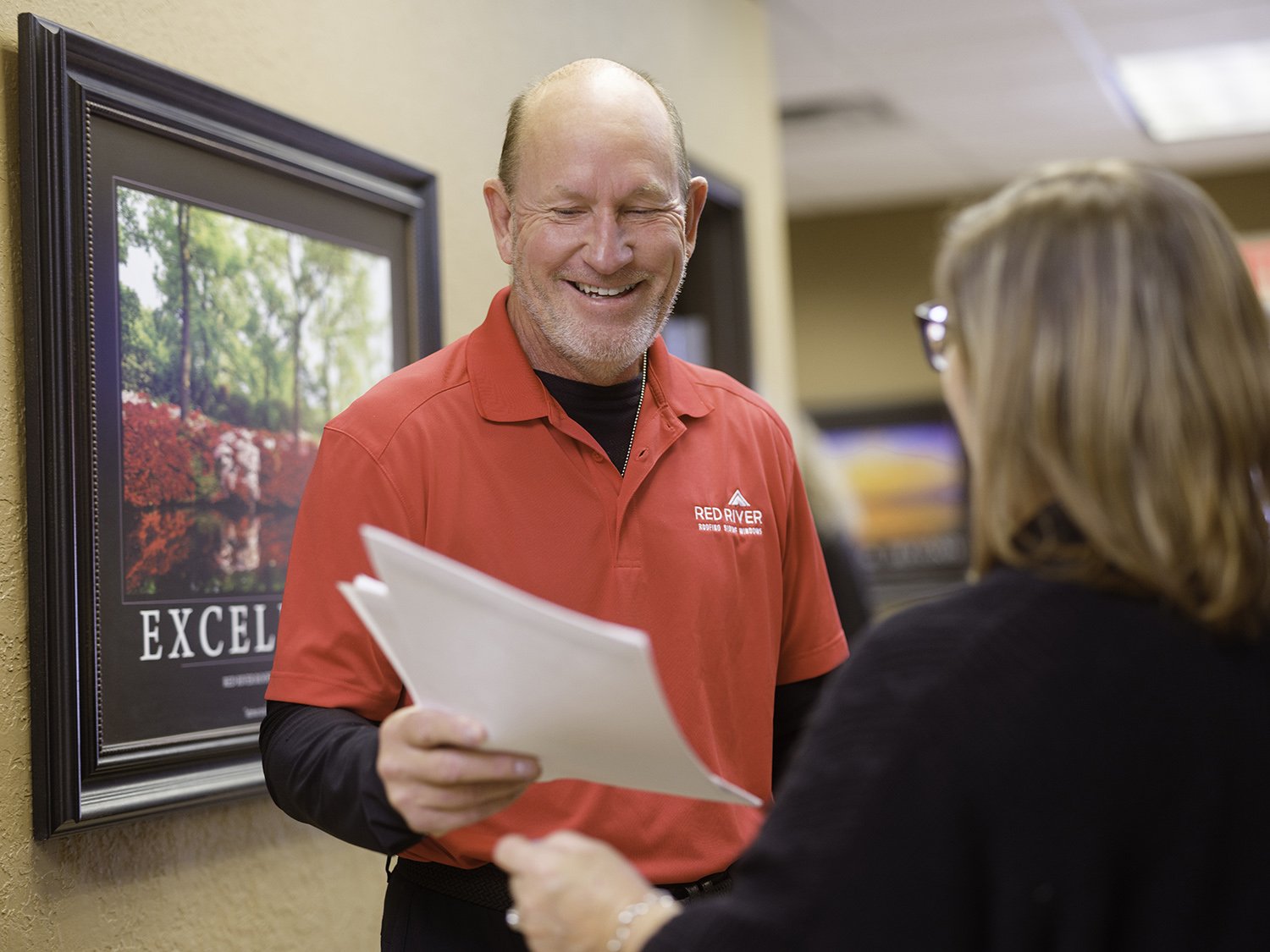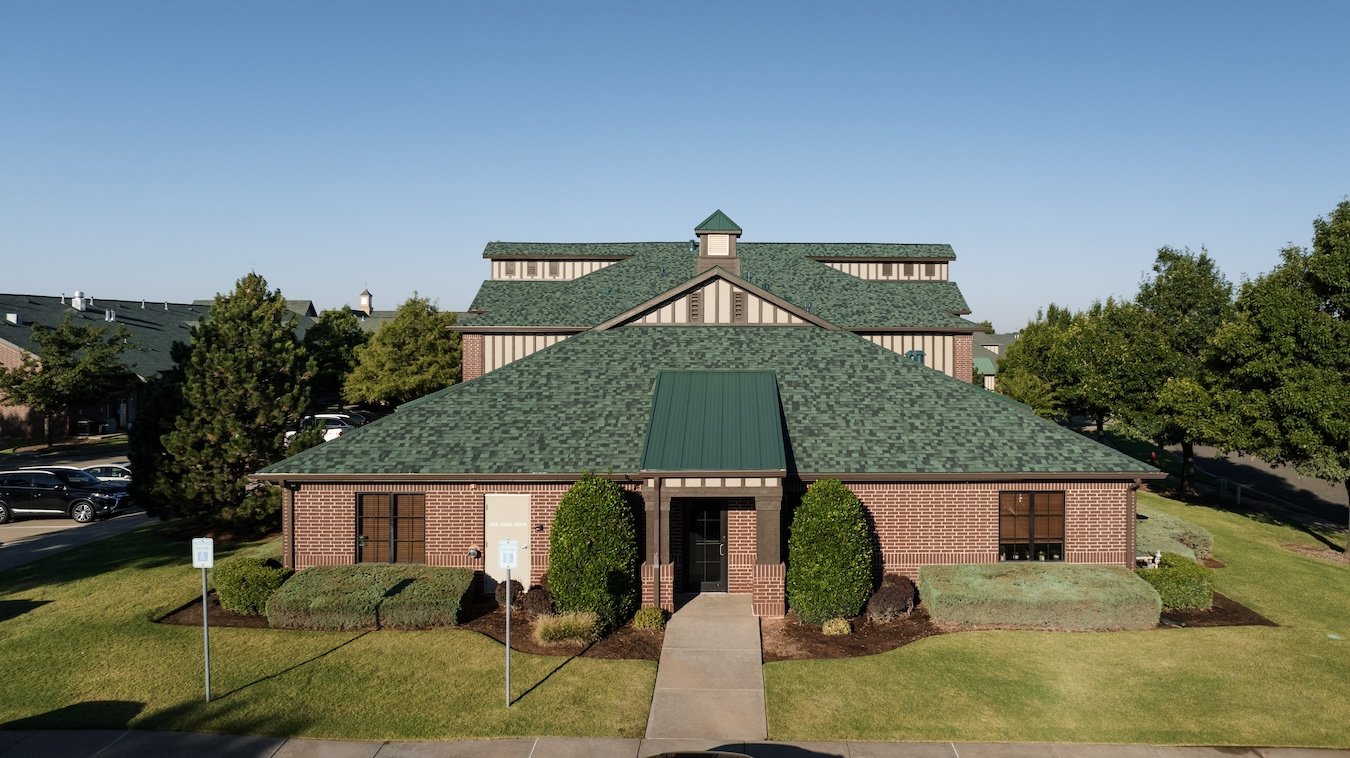
Choosing a Contractor
How to Make the Right Choice for Your Home or Office
When it comes to protecting your home—your most valuable asset—choosing the right roofing contractor is essential. In Oklahoma, roofing contractors face minimal regulation, often leading to an influx of out-of-state roofers after major storms, offering quick fixes that may appear convenient but result in poor quality and lasting issues. As a locally owned and operated company, we are committed to helping Oklahomans make an informed decision about their home. That’s why we’ve compiled the following guidelines to help you make your decision when choosing a roofer.
-
Fly-by-night and storm chaser contractors will try to fool you into believing they carry a valid policy for Oklahoma. If they don’t carry a valid worker’s compensation policy in Oklahoma, you are exposed to the liability risk of a work site personal injury lawsuit. You can verify coverage here.
-
What if the roofing crew damages your car, HVAC equipment, or other parts of your home? Worse still, what if they burned down your house? This may seem drastic, but it’s possible. Ask the contractor for a certificate of insurance.
-
The State of Oklahoma requires all roofing contractors to be registered with the Oklahoma Construction Industries Board (CIB). The Roofing Contractor Registration Act is available here. Failure to register is a misdemeanor punishable by a fine of up to $500. The roofing contractor is also required to display their registration number on each commercial vehicle used for roofing services.
-
Storm Chasers often set up a small temporary office and use magnetic graphics and yard signs to give the impression they are local. A qualified local contractor will have a permanent office sufficient to run a professional business. Before you sign, visit the contractor’s office to verify they will be around to take care of your needs and back up their work.
-
You may check this by contacting the Oklahoma Secretary of State at 405.521.4138 or by clicking here and searching for the name of the business. Click on the blue “Filing Number” link and look for the formation date. This is one of the best ways to verify the number of years in business and in Oklahoma. More than 75% of contractors have been in business fewer than 5 years, with very low experience standards.
-
Check the salesman's driver’s license to see if they are local. Many storm chasers will fraudulently use the company name of a local company to pass themselves off as local, only to leave the small company owner with problems and warranty issues from poor quality workmanship. Check the license plate of the salesman’s truck to see if he and his workers reside in Oklahoma. It’s unfortunate that deception is a big part of the industry.
-
Ask the contractor for the name and phone number of the distributor to be used so you may verify their credit history. If a contractor doesn’t pay their distributor, you are on the hook. A full list of contractor suppliers is a great source of references.
Some of our local distributors:
ABC Supply – 405.627.9348
SRS (Southern Shingles) – 405.688.0100
All American Building Products – 405.232.1890
Lansing Building Products – 405.943.2493
Beacon Supply – 405.605.7807
Spec Supply – 405.832.1566
-
Contact top shingle manufacturers’ area representatives to inquire about any contractor you may be considering for your project.
Lance Donley, Owens Corning Roofing Products – 405.465.1233
Trevor Thomson, CertainTeed Corporation – 405.826.2994
James Brooks, GAF Material Corporation – 405.205.1715
-
If a contractor is not a member of its national association, it certainly does not put a priority on continuing education, specifications, product changes or legal and code issues. Any member can be looked up here or by calling the NRCA at 847.299.9070.
-
Take note of companies that pre-load the shingles on the rooftop. This lowers labor costs but strains your ridge row. It’s a surefire way to cause structural defects to the framing – sometimes to the point of roof collapse.
-
Very few roofing contractors will have a true manager assigned to your project. Without someone monitoring specifications, your roof WILL NOT be installed correctly. Critical areas requiring expertise and supervision:
Fastener placement and proper fastener selection
The fastener location and length of the fastener are very specific for composition shingles. Ridges take a different length nails than the field of the roof, and staples should never be used in any type of roofing.
Flashings
Proper inspection of existing flashing and replacement or addition as needed.
Sealants/adhesives
Different adhesives & sealants are required for different areas of the roof.
Ventilation
Without proper ventilation to the manufacturer’s specifications, you will not have a valid warranty from the manufacturer.
Manufacturer specifications
Every roof is different and has different requirements. It is imperative to be trained to the manufacturer’s specifications.
Jobsite protection
Protection begins and ends with a pre-job interior and exterior inspection by the project manager. Precautions are taken to prevent damage to such areas as landscaping, windows, A/C condensers, and gas vent connections. Jobsite protection also means a thorough cleanup after completion.
Before you choose a contractor, make sure a factory-trained project manager is assigned to your job. This person is not a member of the crew – he is a true manager. You should expect the manager to be on the job site at least 2-3 hours per day.
-
Get several references – and make sure some are for local projects at least six months or a year old. You can easily spot a storm chaser because they won’t have any such references.
-
This is another resource to legitimize a contractor and how long they have been working in your service area.
-
Most small businesses fail before they are five years old. Roofing is no exception to this statistic and would even rank as one of the higher categories for failure because most people setting up roofing companies have limited business skills.
-
Simply said, if a contractor doesn’t have a physical office/showroom, they aren’t legitimate. We always welcome visitors to swing by our office and meet our staff of professionals. Our staff are very proud of what we represent.
If your contractor passes muster on all these criteria, you should be in good hands. Sadly, most don’t meet these requirements. Learn more about Red River’s commitment to residential roofing services, or call us today for a free inspection!

Have Questions? We Have Answers!
What Our Customers Are Saying

